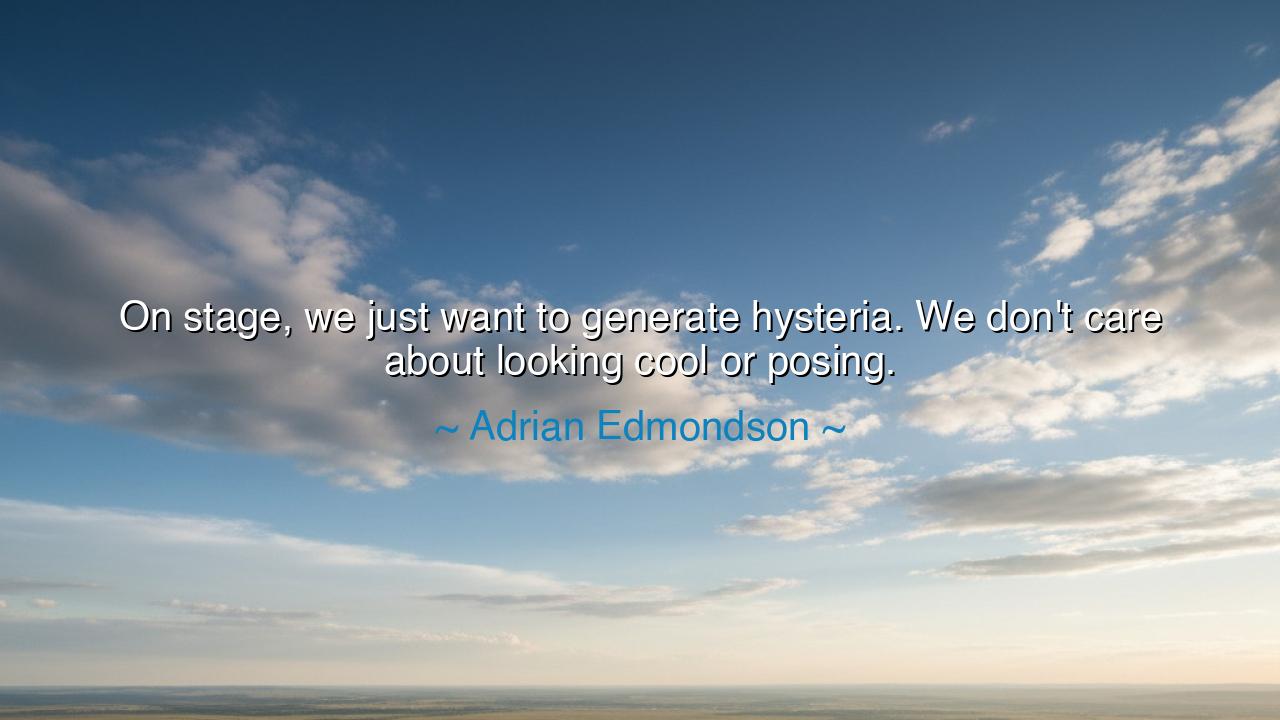
On stage, we just want to generate hysteria. We don't care about
On stage, we just want to generate hysteria. We don't care about looking cool or posing.






“On stage, we just want to generate hysteria. We don’t care about looking cool or posing.” These words, uttered by Adrian Edmondson, carry a fierce and liberating truth. They come from a man who built his craft not upon vanity, but upon raw energy, honesty, and unrestrained expression. In them lies a timeless lesson—not only for those who stand upon stages, but for all who seek to live and create boldly. Edmondson, known for his wild performances and irreverent comedy, reminds us that true art is not born from control or image, but from passion unchained.
To “generate hysteria” is to awaken emotion—to stir laughter, shock, or awe in the hearts of those who witness you. It is to pierce through apathy and ignite the soul. Edmondson’s art was never about appearing “cool,” for coolness is the mask of fear. To be “cool” is to restrain one’s spirit, to care too much for appearances, to measure one’s fire so that it does not burn too brightly. But the performer, the creator, the human who wishes to move others, must let that fire consume him. The stage, like life, demands surrender—the courage to be ugly, loud, foolish, and alive.
The origin of Edmondson’s words can be traced to his days in Britain’s anarchic comedy scene of the late twentieth century. He and his comrades—such as Rik Mayall, his friend and creative partner—rose from the underground clubs of London with a new kind of comedy: violent, chaotic, and filled with the wild pulse of rebellion. Their performances in shows like The Young Ones and Bottom shattered convention. They did not seek elegance; they sought reaction. They threw themselves—sometimes literally—into their art, embodying this truth: that it is better to be unforgettable than to be admired at a distance.
In this spirit, Edmondson’s philosophy echoes that of the ancient performers and poets. Consider the Dionysian festivals of Greece, where actors and revelers would lose themselves in madness and ecstasy, believing that in chaos they could touch the divine. To “generate hysteria” was, to them, to awaken the gods within men—to strip away the dullness of civility and remind humanity of its primal, passionate nature. The stage, then, was not a place for vanity but for revelation. Edmondson, though a man of modern times, spoke with that same ancient spirit—the belief that truth lies not in perfection, but in intensity.
In every age, there are those who choose pose over passion, who polish their every move until nothing real remains. They may look graceful, but they do not stir the soul. The artist who fears to look foolish can never touch greatness. History remembers not those who stood still and looked beautiful, but those who dared to be wild—those who shattered form to reveal truth. Think of Beethoven, pounding his piano until the strings broke, or Van Gogh, painting with trembling hands and heart on fire. They cared nothing for coolness; they lived for the storm that lives inside creation.
From Edmondson’s words, we draw a lesson as fierce as it is freeing: Do not care about posing—care about passion. Whatever your stage may be, whether it is a classroom, a workplace, or the arena of life itself, bring your whole self to it. Let sincerity replace polish, and courage replace image. Dare to speak, act, and create in ways that make others feel something real. For the world has enough coolness, enough detachment, enough masks. What it lacks is the brave madness of authenticity.
To live by this truth is to live fully awake. When you speak, let your words be alive with conviction. When you work, let your spirit be fierce and joyful. When you love, let it be without calculation. And when you create—whether a song, a joke, or a simple gesture—seek not to impress, but to move. Let others call it chaos, if they will; for in that chaos lies life.
Thus, remember the wisdom of Edmondson: hysteria over composure, truth over image, fire over frost. For in the end, the stage of life does not honor those who posed most gracefully—it honors those who dared to burn so brightly that even the shadows could not forget them.






AAdministratorAdministrator
Welcome, honored guests. Please leave a comment, we will respond soon